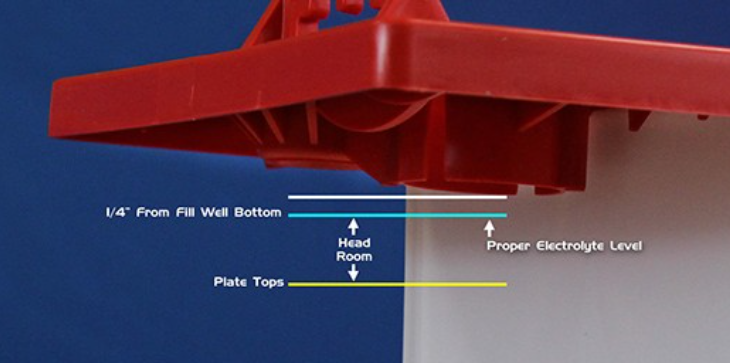Hello everybody... In May this year I replaced the pair of Napa house batteries that were OEM in our 2017 Aspect 30J. Very generically branded looking. Winnebago part numbers and a small NAPA label very plain look to them. There was nothing wrong with them except the back one leaked slightly.
Right before I swapped them out with a identical set, I determined that the flimsy top compression bar that keeps the battery pair from shifting in transit was WAY over-tightened on the back bolt from the factory.
That over-tightening pinched down the top thicker hard plastic of the battery enough to put a hairline crack right where that piece seals at the vertical battery side wall.
I know nothing about batteries other than they are heavy and the acid will burn a hole in your clothes pretty much. I also knew the set we had fit the bill for how we camp, so back with an identical set which made for no problems with connectors. My set I am relying on to crank the Gen Set only pretty much.
Only reason I swapped them was I was tired washing off the acid boil over in my catch tray I keep underneath when parked outback, and I was concerned about the effects it would cause the tray if I kept ignoring it. I constantly keep a trickle to them off a 100 watt panel when stored.
So..I called NAPA here in Po-Dunk and he told me over the phone he had a two deep cycle Group 31. I remember as I initially looked at them the guy picked them up off the concrete direct. I don't know if that is wives tale, but just for good luck I never set mine direct on concrete.
So when I asked the guy what was up and why I don't have access to the cells, he assured me they were "Maintenance Free". I said Maint free in Texas?...he then said.. Err, oh if you want to fill them or check the cell just peel off the slick strip label from the MFG that covers the cell tops. They lull you into a sense of complacency for a reason...sell you a new set...
One month almost to the day after I installed them I pulled off that pretty looking strip and to my surprise each cell took 4 oz of Fluid (Per Cell). Now as a consumer I would much rather prefer to have my new Battery filled to the cat eye from the factory with Battery Acid as opposed to me diluting the mix with 4 oz (Per Cell) of Distilled Water 30 days from the date of a new purchase.
A pair of the below cost me $348.05 after all core and handling charges in May 2021 at NAPA.
I am probably going to service my batteries today as the temps are cooling off. Might do it today as the winds are coming with the much cooler weather this week.


